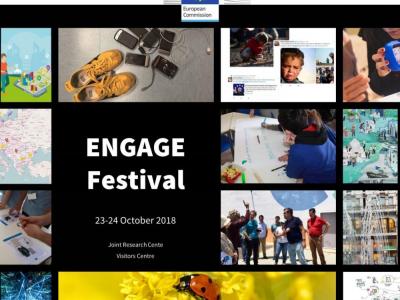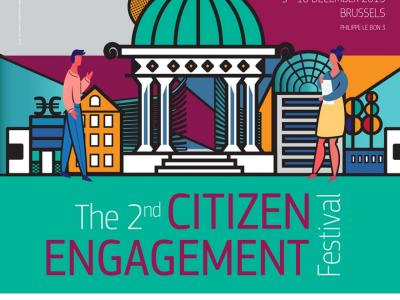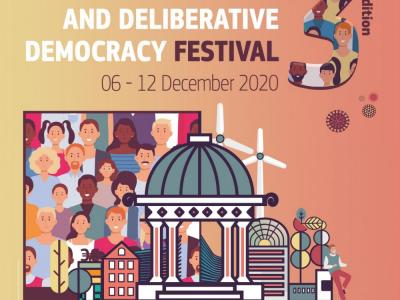Festival 2022 > About
About the Festival
The Public Participation and Deliberative Democracy Festival is an open event that brings together people of diverse backgrounds who are interested in, and work on, engagement of citizens in science, policymaking and deliberative democracy, in Europe and beyond. These include representatives from EU Member States, EU institutions, civil society organisations, research and academia as well as the arts world. The programme each year features a variety of events including conversations, interactive sessions, artwork and an exhibition of participatory and deliberative democracy projects. The Festival is also the main networking event of the Community of Practice of the Competence Centre on Participatory and Deliberative Democracy.
Social and political context
Rise in extremism, political polarisation, online disinformation and politically manipulated information, growing distance between citizens and elected representatives… These are just some of the challenges that democracies around the world are facing. Despite this – or perhaps precisely as a response - initiatives and practices that rejuvenate and strengthen democracy by involving citizens more directly in the policymaking process are flourishing. In Europe alone we’ve seen abortion reform in Ireland thanks to Citizens’ Assemblies, while there is now a standing citizens’ assembly in Paris and a permanent citizens’ council in Ostbelgien, Belgium. In the last 12 months, we have seen Europe’s largest ever deliberative event, the Conference on the Future of Europe. What these initiatives all have in common is that they allow citizens’ voices to be heard beyond election time, providing people with an opportunity to more directly shape policy. Such processes of citizen participation in policymaking are increasingly being recognised as crucial to delivering better policies, strengthening democracy and building trust in institutions. We envision the Festival as a way to reflect on and nourish these new forms of citizens’ involvement in decision-making processes.
This year, to coincide with the European Year of Youth, the theme of the Festival is ‘Youth Participation’
2022 is a year in which we find ourselves with difficult decisions to make, amid conflict, whilst looking to a future beyond the pandemic and war. That is why the Commission is reaching out to young people for their vision, engagement and participation to co-create the futures they want. According to the 2021 European Year of Youth Survey, 62.9% of respondents did not know or were not sure how to make their voice heard or express their opinion. In response to these findings, we hope to create space for participatory reflection on how young people can be better, and more, engaged in policy and research processes, and to bring these insights together.
To better understand particularly underexplored aspects of youth participation, we propose to focus on a number of sub-themes. First, we wish to bring up the roles that local and indigenous youth play in traditional knowledge transmission and circulation, with particular focus on science and policymaking. We also wish to reflect on space, with the ways we can harness both virtual and physical spaces for better participatory and deliberative outcomes with, and for, youth. Finally, to celebrate the Presidency of the Council of the EU, which during the Festival will be held by Czechia, we hope to put a spotlight on participatory and deliberative democracy in Czechia.
History
The Festival, currently being in its fourth instalment, has been changing through the years. Nested within the Joint Research Centre, looking both inwards and outwards, its evolution reflected the events unfolding in the world and the internal political processes within EU institutions.
The first instalment of the Festival took place in October 2018 in Ispra. It was connected to the formal launch of the Community of Practice on Citizen Engagement at the Joint Research Centre and aimed to reach out to other interested colleagues across the Commission. Through this, we wanted to widen the understanding of the role of citizen engagement for policy across the Commission. At the same time, by bringing in the practitioners, we hoped to enrich the mapping of citizen engagement initiatives, contributing to capacity building, knowledge about citizen engagement tools and methodologies. During the sessions and conversations we discussed some cross-cutting challenges and opportunities to develop a programme of collaborative initiatives for the Community of Practice.
In December 2019 we met for the second time, this time in Brussels, with the main aim being to inform policymakers in other Commission services and EU institutions about the practical ways to carry out citizen engagement and to identify new needs and challenges. The Festival also offered the opportunity to better connect practitioners, between themselves and with policymakers from EU institutions, and so to foster partnerships across the EU.
The third instalment of the Festival took place entirely online due to Covid-19 pandemic. During that week-long meeting in December 2020, we reflected on how democracy is changing and how citizens can participate in this change. Taking a very practical turn, and responding directly to the unprecedented situation created by the pandemic, we discussed how we can make best use of citizen engagement processes in the crisis and post-crisis situations and how we can ensure that physical distance does not prevent the publics to engage, co-create or deliberate on policies that affect them.
Meet the Festival team
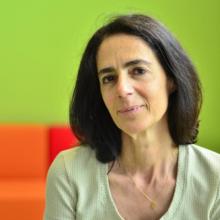
Ângela has been at the European Commission’s Joint Research Centre since 1992. She leads the Competence Centre on Participatory and Deliberative Democracy, contributing to mainstream citizen engagement practices across the EU policy cycle and science. She has been involved in many European projects focusing on environmental and technology governance, future-oriented activities and public engagement institutionalisation. Post-normal science inspires her work on governance of and dialogues about policy, science and technology.
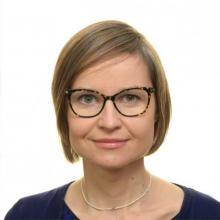
Agnieszka has worked at the European Commission for fifteen years. She is currently an administrative and financial advisor supporting the work of the Competence Centre on Participatory and Deliberative Democracy.
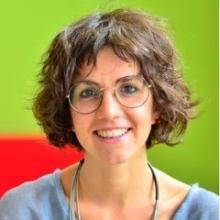
Anna Paola works as a Policy Analyst at the Joint Research Centre, European Commission. She has an interdisciplinary background rooted in economic and political geography, food studies and critical theory. Her work currently focuses on participatory governance of environmental issues and public spaces for citizen engagement. Co-author of Engaging with Food, People and Places. A toolkit.
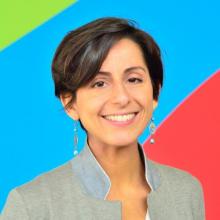
Elisa is policy analyst at the JRC and contributes to the work of the Competence Centre on Participatory and Deliberative Democracy in the field of evaluation of citizen engagement processes, training and capacity building, as well as in specific policy files such as pollinators’ protection through the STING project.
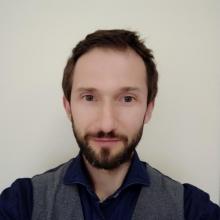
Mateusz works as a policy analyst at the JRC, supporting the work of the Competence Centre on Participatory and Deliberative Democracy. He has a background in media studies and environmental studies, with particular focus on environmental ethics. He currently coordinates projects on the engagement of citizens in the protection of biodiversity. Previously, he worked as a researchers as well as scientific and literary editor.
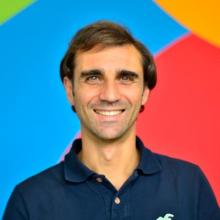
Paulo is a policy analyst at the European Commission's Joint Research Centre. He provides advice and support to the various activities of the Competence Centre on Participatory and Deliberative Democracy. His current work focus is the Conference on the Future of Europe.
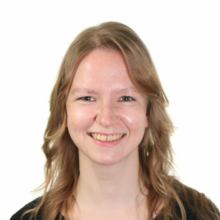
Roxanne studied Literature and Languages at the University of Vienna and driven by her interest in the civil transformation that is supported by the digital transformation she started working on the topic of public spaces, focusing on communication, transliteracy and education. Currently, she is trainee at JRC Ispra.
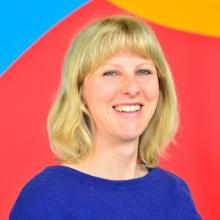
Tessa has worked at the European Commission’s Joint Research Centre since 2017. She works on the Community of Practice for the Competence Centre on Participatory and Deliberative Democracy. Tessa completed a Masters degree in ecological economics and sustainability at the Institute for Environmental Science and Technology (ICTA) at the Autonomous University of Barcelona and is now completing her PhD on political science at the same institution. Prior to this work, Tessa was a television journalist at Reuters in Hong Kong before working as a Communication Expert at the European Forest Institute in Barcelona.
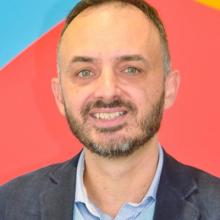
Ventseslav is a Policy Analyst at the European Commission and is part of the team behind the CC-DEMOS. Ventseslav works on the elaboration of practical guidelines for the evaluation of citizen engagement processes, and contributes content on practices and methods of citizen engagement to the training offer of the CC-DEMOS.

